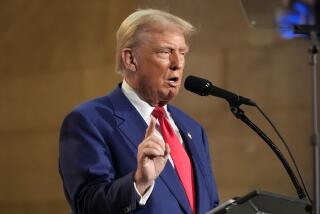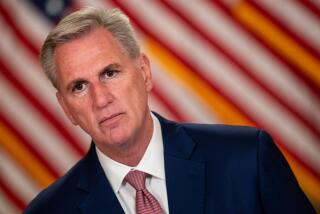Bush Calls Tax Cuts Equitable
- Share via
KENNESAW, Ga. — President Bush sought Thursday to build momentum for his $670-billion tax cut plan, arguing in a speech in this Republican stronghold that the proposal would create jobs and would not unfairly benefit the rich.
The 10-year tax cut plan -- which has been greeted coolly by some centrist Republicans -- received a small boost when a Democrat, Sen. Zell Miller of Georgia, broke ranks with his party and pledged to sponsor the legislation.
“The cornerstone of good economic policy recognizes that the money in Washington, D.C., is not the government’s money, it’s the people’s money,” Bush said to his enthusiastic audience. “And the more of it you have in your pocket, the more likely somebody is going to find a job.”
The optimistic tone of the president’s speech was buffeted by a wave of somber economic news released Thursday. The Labor Department reported a sharp increase in inflation in January -- 1.6%, the largest jump in 13 years. The Conference Board, a New York research group, reported a 0.1% decline in its leading economic indicators, following three months of improvement. And the Commerce Department said last year’s trade deficit hit an all-time high of $435.2 billion.
Bush made no mention of those figures. Instead, he delivered a speech that laid out in more detail than in the past why he thinks cutting taxes is the solution to the economy’s woes.
A major theme was that because many small businesses pay taxes at the same rates as individuals, tax cuts would generate more money for hiring.
Most jobs “are created by our small businesses, by the entrepreneurs of America,” the president said. His proposed elimination of the dividend tax means “Americans would get more money to save and more money to invest. And that means that more capital will be available for companies, large and small, to use for expansion.... Capital equals jobs.”
Bush repeated assertions that ordinary Americans would benefit from the dividend tax’s demise because many more in the middle class now own stock. And he suggested that the more companies offering dividends, the more likely they are to be better corporate citizens.
The president indirectly responded to critics who say the tax cuts would disproportionately benefit wealthier Americans by saying, “it’s only fair” that all taxpayers benefit from his plan.
“If you pay taxes and there’s going to be tax reduction, everybody who pays taxes ought to get relief,” Bush said. “It’s only fair that it be done that way. You don’t want your government picking winners and losers ... when it comes to tax policy.”
He acknowledged that his plan, coupled with increased military spending, will generate significant federal deficits. “When it comes to the deficit, I believe the best way to get out of it is to grow the economy so more revenues come in, and then make sure Congress doesn’t overspend,” Bush said.
The speech was Bush’s sixth appearance to push his tax cut and an additional $4 billion in new spending since he unveiled his economic stimulus plan Jan. 7. The proposal has encountered stiff resistance from Democrats and has been met with skepticism from moderate Republicans, many of whom express concern about the deficits and their long-term effects.
Senate leaders, including Finance Committee Chairman Charles E. Grassley (R-Iowa), have said the president’s plan may have to be scaled back to have a chance of passing.
The choice of locale appeared designed to showcase Miller, a conservative Democrat. He co-sponsored Bush’s $1.35-trillion tax cut plan that became law in 2001, and his sponsorship of this second plan had been expected.
Senate Minority Leader Tom Daschle (D-S.D.) said other Democrats are unlikely to follow Miller’s lead. Referring to some of those who have expressed doubts about Bush’s plan, Daschle said: “The support of one Senate Democrat does not negate the criticism of [Federal Reserve] Chairman [Alan] Greenspan, the condemnation of 10 Nobel laureates, the unenthusiastic response of dozens of elected Republicans and the unfairness to the majority of Americans. The plan is still the wrong plan for the country and it is still dead on arrival.”
Miller introduced the president to the audience in the Harrison High School gymnasium.
Only a handful of student leaders were permitted in the gymnasium; instead, Republican supporters in this community north of Atlanta packed the bleacher seats. Most of the student body, which had decorated the corridors with hand-drawn banners welcoming the president, were confined to their classrooms and watched the speech over closed-circuit TV.
The students had been warned that antiwar signs or other protests “would not be tolerated” during the president’s visit, according to the Marietta Daily Journal.
More to Read
Get the L.A. Times Politics newsletter
Deeply reported insights into legislation, politics and policy from Sacramento, Washington and beyond. In your inbox three times per week.
You may occasionally receive promotional content from the Los Angeles Times.










